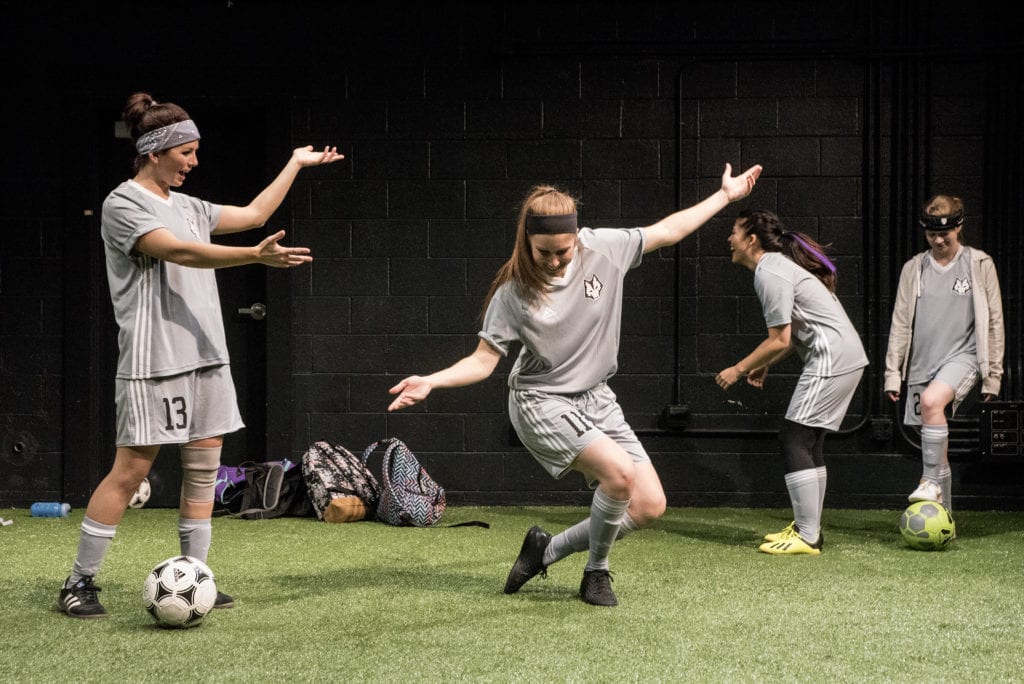
‘The Wolves’ lays bare the lives of girls on the cusp of womanhood
by Alex Miller, Onstage Colorado (Read the original.)
On its surface, “The Wolves” is a play about a girls’ soccer team. Known only by their team numbers, the show opens on the eight young women on the team doing their pre-game stretches while bantering and arguing about everything from feminine hygiene products to the latest school gossip.
But the match they’re about to play will never be seen; we’ll only hear after the blackout whether they won or lost. And then the arguing and banter resumes. These girls, high school juniors who’ve known one another a long time, like their soccer but mostly, it seems, the game serves as a buffer zone in the midst of their (to them) complicated lives in “middle America.”
A high school soccer club is the backdrop for a searing portrait of nine young women
Enter the black-box theater at Boulder’s Dairy Center to see this production by the Boulder Ensemble Theatre Company and there’s only a patch of artificial turf for a set. Director Rebecca Remaly uses blackouts to great effect, covering the entrances and exits with total darkness and blaring pop music. And then — Boom! — the girls are there again. Maybe a week has passed, or an hour, but they appear with the same jarring effect to resume their stretching and bickering.
There’s not much of a plot.
There’s no discernible protagonist.
There are no parents (save the final scene), men or teachers.
We never see them play.
The Wolves are a pretty good team, but they’re not champions. There’s no do-or-die game or inspirational leader. In fact, the unseen coach who oversees the team is an oft-hungover loser, an object of ridicule for the girls.
What’s going on here?
“The Wolves,” it turns out, has more in common with “The Breakfast Club” than “Remember the Titans.” Call it a slice of life or a collection of character studies, but these girls could just as easily have been in a band, a dance class or on a prom committee. The team is just the device that brings them together — a disparate group of recognizable types who quickly establish themselves: nerd, hippy, joker, worry wart, bad girl, bossy-pants.
It’s pretty good stuff; a powerful piece of theater with an outstanding cast of young women who so convincingly inhabit their roles that we can scarce imagine them out of uniform. When the ninth girl (Kate Parkin as No. 46) joins the team, it sets in motion a ripple effect that disrupts the established order of the team and challenges the team’s top player (Erika Mori as No. 7) for her spot as striker.
But as the mundane topics of team politics, school, boyfriends, parents and coaches continue to drive the pre- and post-game conversations, the lack of any big plot turn points to something ominous around the corner. Until then, it’s actually kind of fun. For about three-quarters of the 90-minute show — presented without intermission — there are enough laughs to almost call “The Wolves” a comedy.
Máire Higgins (No. 13) is a joy as deliverer of one-liners, delivered in the actress’s deadpan husky voice. Poor No. 2 (Hannah Haller) has a helicopter mom whose concern over concussions has her arriving at each game with increasingly protective headgear. And as the ill-tempered No. 7, Mori provides quite a few laughs as she battles team captain (Lois Shih) and mixes it up with frenemy, No. 14 (Catalina Garayoa).
And then, tragedy.
I won’t give it away, but playwright Sarah DeLappe didn’t pick from more timely choices like a school shooting, suicide or drug overdose. The tragedy here isn’t to make a point about any of these current topics but, rather, to throw the lives of The Wolves into stark relief: All that crap they were bitching about, arguing and stressing over suddenly seems so very petty in the face of their new reality.
Life’s like that sometimes. Well, most of the time. On the cusp of adulthood, the young women in this play learn a lesson that, for many, doesn’t come until later. The sobering reality of loss is, indeed, something today’s high-schoolers seem fated to deal with at a greater rate than generations past. By choosing to put the aftermath in the final scene, DeLappe forces us to mull over what preceded it and how it all fit together. Like so many tragedies, there’s often no explanation. For those who might leave this show shaking their heads wondering what it was “about,” that’s exactly the point.
I’m not entirely sure how “The Wolves” came to be a Pulitzer finalist given its loose structure, but the dialogue throughout contains a great deal of authority and verisimilitude — and this cast nails it. Comprised mostly of Colorado actresses not much older than the characters they portray, they all bear watching. I look forward to seeing this talented bunch in many more productions around the state.
“The Wolves” runs through Nov. 18.
